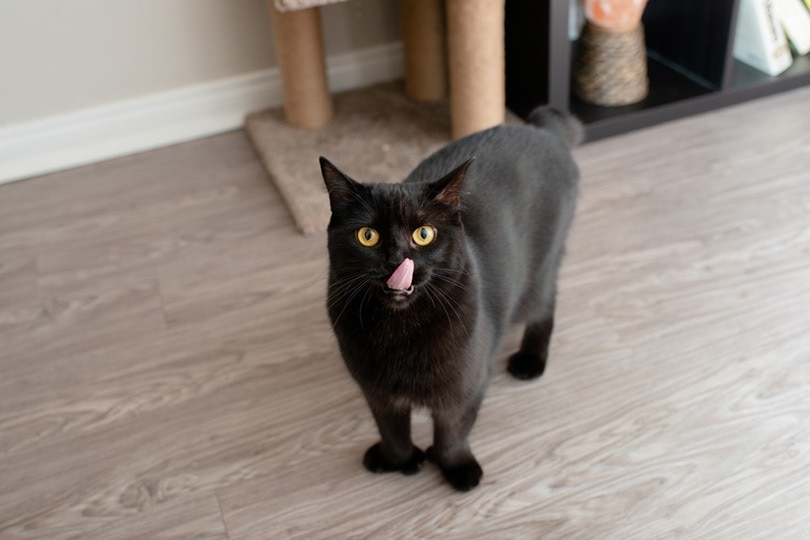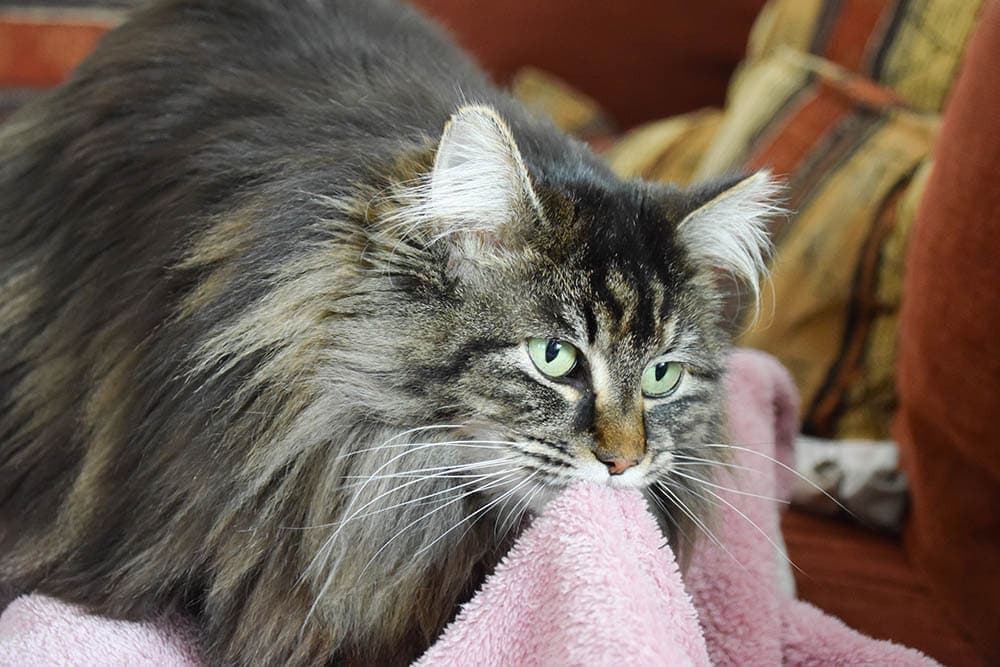Can Cats Eat Oatmeal? Health & Safety Guide

Updated on

Sitting down to breakfast with a bowl of hot oatmeal in front of you is a great start to the day. Not only is oatmeal delicious, but it’s also a food that promotes good health1. Maybe you’ve been wondering if your cat can eat oatmeal as well. The answer is yes, cats can eat oatmeal but in moderation.
You might be surprised to learn that there is cat food containing oatmeal that’s made for cats with sensitive stomachs and skin2. If you’d like to treat your cat to a bit of oatmeal now and then, go ahead but don’t overdo it. Oatmeal is high in fiber, which is good for digestion. Plus, oatmeal contains healthy things cats need, like antioxidants, vitamins, and minerals. However, cats are carnivores that need to eat protein, fat, and calcium, so don’t stop feeding your cat a good quality kibble or wet food.
How Much Oatmeal Can You Give Your Cat?
A sensible portion of oatmeal to give a cat as a treat would be about a quarter of a cup. This amount would contain roughly 70 calories, 12 grams of carbs, 3 grams of protein, and 1.5 grams of fat. Remember to only give your cat oatmeal on occasion and don’t make it a daily thing. This way, your cat will learn that oatmeal is a treat and not a food item they get every day.

Skip the Milk and Sugar
While you may like to add milk to your oatmeal and top it with a big spoonful of sugar, that’s not how you should serve oatmeal to your cat. Unlike humans who can tolerate cow’s milk and sugar, cats don’t have the same tolerance levels as us.
If you plan on sharing your morning oatmeal with your cat, don’t add anything to the cooked oatmeal your cat will get. And make sure that the oatmeal is not too hot when you give it to them. It’s fine if the oatmeal has some water in it when you serve it to your cat, but make sure that water has cooled to room temperature before setting the bowl down.
Other Human Foods Your Cat Can Eat
Oatmeal isn’t the only human food you can share with your cat. As you probably know, cats love eating fish. You can share certain fish with your cat, such as salmon, cod, mackerel, or panfish. You can even give them some fish from a fishing trip you went on, such as perch or bluegill.
Meat like poultry and beef is another option for your little carnivore. Just be sure to cook the meat without adding any spices and skip any processed meat as it’s best to keep it natural. Some other human foods you can share in moderation with your cat include:
- Bananas
- Berries
- Melon
- Carrots
- Rice
- Pumpkin
- Cooked eggs
- Spinach
Human Foods You Should Never Feed Your Cat
Now that you know what human foods are okay to give your cat, there are some foods not to be shared with your feline friend. The first food we’ll mention here is tuna. Even if your cat goes bonkers when you open a can of tuna, your cat should not eat it because too much tuna can cause mercury poisoning in cats.
While it takes quite a bit of tuna to cause mercury poisoning in a larger animal, just one can of tuna a week can cause mercury poisoning for a small animal like a cat.
A cat with mercury poisoning can suffer from a lack of coordination, muscle weakness, confusion, memory loss, and more. Therefore, it’s best to steer clear of tuna as too much of it can be dangerous to your pet’s health. There are plenty of other foods you can share with your cat so don’t feel bad about not giving your little friend some of your tuna.
Other human foods that can be harmful or toxic to cats include:
- Onions
- Grapes
- Raisins
- Garlic
- Chives
- Chocolate
- Shallots
- Leeks
What to Do If Your Cat Eats Something Toxic
We all know that cats are mischievous animals that can get themselves into trouble now and then. If your cat gets into your pantry and eats something toxic, don’t panic. Keep your wits about you and check how much of the item your cat consumed. Then give your veterinarian a call so you can get some professional advice.
Depending on what your cat ate and the quantity, your vet may tell you to keep a close eye on your cat to watch for any symptoms to develop. Or you may be told to take your cat to the vet’s office right away.
To avoid this entire scenario, keep all toxic foods up and out of your cat’s reach. If you keep toxic foods in a walk-in pantry keep that door closed tightly so your cat can’t sneak in.

 Conclusion
Conclusion
The next time you whip up a batch of oatmeal for yourself, it’s fine to share some with your cat. Just skip the milk and sugar and don’t serve the oatmeal hot.
It’s fine to share a little oatmeal with your cat now and then, but don’t make it a daily habit. Your cat’s daily diet should consist of quality kibble or wet cat food that meets all their nutritional needs.
Featured Image Credit to: jmexclusives, Pixabay










